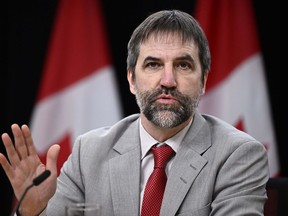Article content
Environment Minister Steven Guilbeault says critics of the Trudeau government’s policy to mandate that all new vehicle sales in Canada must be EVs or plug-in hybrids by 2035 are engaged in horse and buggy thinking.
Advertisement 2
Article content
Never one to pass up an opportunity to toss a grenade into the federal government’s $200-billion-plus climate change agenda, Guilbeault made the comment in a year-end interview with iPolitics.
Article content
As the former Greenpeace activist, Toronto CN Tower climber and occupier of the roof of then Alberta premier Ralph Klein’s home – he said it was to promote roof-top solar panels – put it:
“I think the knee-jerk reaction is like what we saw a little over 100 years ago, when the internal combustion engine was marketed and commercialized. A lot of people said, ‘No way, I’m not leaving my horse and chariot,’ but after a while, it became obvious that it was the right thing to do for a range of reasons. I think we will see the same thing with EVs, so I’m not really worried about that.”
Article content
Advertisement 3
Article content
Asked about the loss of choice for consumers in the name of saving the planet, Guilbeaut responded most people have no choice but to buy gasoline-powered vehicles today, and they will still be able to buy new ones up to 2034 and used ones after that.
The government’s mandate is that new EV and plug-in hybrid sales, now about 10% of the market, fuelled by federal and provincial subsidies to buyers, must double to 20% by 2026, rising to 100% in 2035.
Guilbeault’s reference to “horse and chariot” thinking actually raises the point that up to the 19th century owning horses was the preserve of the wealthy – similar to many high-end EV and plug-in hybrids today. Ordinary people couldn’t afford them.
Recommended from Editorial
Advertisement 4
Article content
The mass use of horses to transport people and goods coincided with the industrialization of the economy, where their omnipresence in cities created an environmental crisis.
As Steven Levitt and Stephen Dubner recount in, Superfreakonomics:
“In vacant lots, horse manure was piled as high as sixty feet. It lined city streets like banks of snow. In the summer time, it stank to the heavens; when the rains came, a soupy stream of horse manure flooded the crosswalks and seeped into people’s basements … All of this dung was terrifically unhealthy. It was a breeding ground for billions of flies that spread a host of deadly diseases. Rats and other vermin swarmed the mountains of manure to pick out undigested oats and other horse feed … cities around the world were experiencing the same crisis.”
Advertisement 5
Article content
Things became so bad that in 1898 a major urban planning conference was convened in New York to address the crisis – the great “Poo Conference of 1898” – as it was dubbed by Horse Canada magazine in a 2014 article.
Delegates concluded that given population growth, global cities would soon become uninhabitable, creating a massive refugee crisis as millions fled for their lives.
In many ways, it resembled today’s annual UN global gabfests on climate change, the latest of which concluded earlier this month in Dubai, from which Guilbeault recently returned.
The irony is that internal combustion engine vehicles were initially hailed as the environmental saviours of cities, by eliminating the need for horses.
But that turned out to be inaccurate.
Advertisement 6
Article content
It took about 50 years for the age of automobiles to overtake the age of horses and far from cars being environmental saviours, new problems arose including congestion, smog and economic carnage as businesses related to the horse trade disappeared and the price of grain collapsed.
As historian Ann Norton Greene of the University of Pennsylvania and author of Horses At Work, told The Tyee in a 2013 article about the shift from horses to cars:
“You can’t change the conditions of a system without damaging a lot of people, business, practices and habits that go with it. People lose not from some fault of their own, but because they are in the wrong place in history.”
Despite Guilbeault’s glibness, the same thing is going to happen with the transition from gasoline-powered vehicles to EVs and plug-in hybrids.
There will be new problems – everything from the fact the raw materials needed to produce them are mined in some of the worst environmental conditions on earth, with China currently dominating the market, to the enormous public costs of overhauling electricity grids so they can handle the increased demand.
There is no free lunch.
Article content




